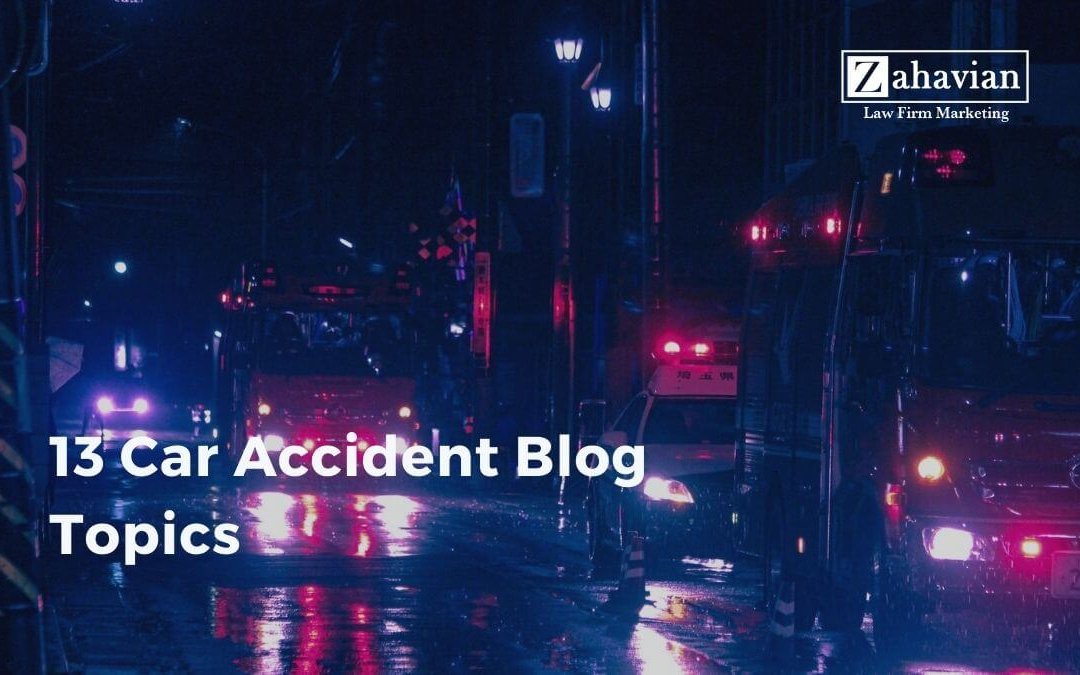For lawyers looking to drive more traffic to their website and attract more clients for their injury and accident practice, then blogging and content marketing is an excellent way to do just that. If you’re looking for blog topics and content ideas to get started, we have compiled a list of the best subjects and categories to include on your law firm’s blog.
Here are 13 car accident blog topics to write about:
- Claims process
- Types of motor vehicle accidents
- Bicycle collisions
- Pedestrian accidents
- Uber & ridesharing
- Types of injuries sustained
- Most common causes of accidents
- Driving and accident statistics
- Hiring a car accident attorney
- Maximizing compensation
- Evidence used in car accident claims and cases
- Determining fault in an accident
- What to do after an accident
1. Claims Process
Accident victims will likely have many questions about the claims process in general. They’re seeking information about everything from reporting to the insurance company to dealing with insurance adjusters, the average settlement for their type of case and how long it takes to settle their claim. “Do I have to go to court to settle my claim” or even “What happens if my accident claim goes to court?” are examples of the types of posts you could publish on this topic.
These are excellent types of questions to answer in blog format. Target your queries and answers to address victims questions within your state. You can use these types of blogs to convert visitors into leads and clients by selling them on the benefits of hiring an attorney.
For instance, in your article discussing how long a settlement can take, you can talk about why it might not be in a victim’s best interest to rush to settlement.
Perhaps mention the different tactics insurance companies use to delay settlement and then put pressure on a quick settlement at the end of the statute of limitations period.
2. Types of Motor Vehicle Accidents
Many of the MVAs your firm sees probably deals with standard passenger vehicles. However, other cases, which tend to have higher awards or settlements, involve other types of vehicles.
When people who have been injured in accidents look for information about their case, they will usually look for information related to the types of vehicles involved in the accident. Some of these type of vehicles include:
- Trucks and Buses
- Motorcycles
- ATVs
- Recreational Vehicles
- Boats
- Bicycles
Provide high-quality information and helpful resources specific to the types of accident cases you would like to attract more of, if they involve any of the types of vehicles listed above.
3. Bicycle Collisions
Bicycle collisions is a large topic with the potential for many future blog posts. If you serve a large metropolitan area or practice statewide, then content for cyclist accidents can be hugely beneficial. There are many considerations in these types of cases that you can share with potential clients.
Everything from the condition of the bike, whether or not the cyclist was wearing a helmet, was it worn correctly, with tight straps and fully buckled?
A number of articles can be written about the road on which the accident occurred. Was it a construction zone, was it a shared-use lane, was the cyclist riding across a sidewalk, instead of walking, were markings and signs pertaining to cyclists and motorists present as well as the condition of road striping and lane markings.
You can publish about the types of collisions such as intersections, right and left hook accidents and doorings. Detail how the collision scenario affects factors such as fault, damages and the overall case.
4. Pedestrian Accidents
Similar to motor vehicle accidents involving cyclists, pedestrian accidents can cause more serious injuries and can even be fatal. Who is at fault and responsible for the accident is different from conventional auto collisions.
On this topic, you can write helpful articles that discuss how fault is determined in a pedestrian collision. Other posts can be published on when pedestrians have the right of way, who covers medical expenses in pedestrian accidents and what to do when a pedestrian is hit by a vehicle.
5. Uber & Ridesharing
Uber, ride-hailing and ridesharing are wonderful examples of innovation to create more efficient markets in personal transportation. However, with more Uber drivers and similar service providers on the roads, there are more injuries caused by accidents involving drivers of these corporations.
Because these stories attract a lot of attention from the media, you can participate and contribute to the news cycle. Whenever an accident occurs involving or at the fault of a Lyft or Uber driver, report on the story in your blog.
Additionally, you can also write posts on how accidents involving these motorists could potentially affect the outcome of a claim.
6. Types of Injuries Sustained
There are many types of injuries that can be occasioned by an MVA. Soft tissue related injuries, such as whiplash are a result of many rear-end collisions. Catastrophic injuries such as brain injury, permanent injuries and disfigurement or even death are more typically seen from more serious accidents, such as those involving high speed collisions, 18-wheelers and motorcycles.
What impacts do different types of injuries (or even wrongful death) have on the process and outcome of an accident case?
If you rather focus on volume of cases rather than blog content that might drive less traffic for these types of catastrophic injuries and accidents, then there is a whole series of blog content that can be written specifically about STI (soft tissues injuries) and whiplash. There are many different grades of severity of whiplash and victims or loved ones of victims are searching for this information online.
7. Most Common Causes of Accidents
There are many causes for motor vehicle accidents, from driving while impaired, to poor road conditions, improper operation of the vehicle, texting and distracted driving.
Write articles that deal with this topic and the implications of each cause. How does the type of accident affect the case – if at all? In many posts on this subject, you can describe how this supports the determination of fault for the accident (more on that later).
8. Driving and Accident Statistics
Blog content on statistics isn’t likely to directly drive many new clients. After all, what victims are looking at stats?
However, it is extremely beneficial to publish high-quality posts with statistics on motorist and driving trends as well as accident statistics. This type of content will support your firm’s ability to earn and build backlinks for your law firm. This builds your firm’s authority and credibility in the eyes of search engines, which will in turn rank you higher for lucrative car accident and personal injury keywords.
9. Hiring a Car Accident Attorney
Accident victims hold a range of ideas about hiring a personal injury lawyer to handle their MVA case. With those thoughts come questions about the process of hiring and working with a car accident attorney. People at this stage in the process are looking for information about lawyers rather than seeking to hire one. This presents an excellent opportunity to be their first point of contact and the blogs they find on your law firm website will convert a number of them into engaged clients.
On this topic, some post and content ideas include “Is it worth hiring a car accident lawyer” and “should I try to handle my car accident claim myself?” where you can discuss how it’s beneficial to them to hire a law firm. Address subsequent questions like “Will I receive more compensation after paying the legal fees?”
10. Maximizing Compensation
A substantial topic that you could write many articles about involves how car accident victims can get the most money from their auto injury claims. This includes the types of damages as well as the factors that lead to larger settlements.
Discuss the types of damages available for accident victims, how types of damages are awarded and the potential value of these damages. For instance, an example blog title could be “How much can you get for pain and suffering in New Jersey?” or “5 Common Types of Damages in Car Accident Claims”. Provide helpful and in-depth information to potential clients on the types of damages.
You can publish in more detail on each type of damage for property losses, disfigurement and income loss.
11. Evidence Used in Car Accident Claims and Cases
Evidence is an important part of a MVA victim’s claim or case. Provide helpful resources and blogs that empower accident victims with information for them to gather and collect their own evidence while they are at the scene of the accident and the process thereafter, such as with injuries and medical attention that can be used to achieve a favorable outcome and get the most compensation they are entitled to.
Post blogs that discuss the different types of evidence, the methods for gathering evidence as well as what is eligible evidence in their accident claims case.
12. Determining Fault in an Accident
Determining fault in car accidents is important for knowing who can claim damages. Many people know by the time they speak with a lawyer that this is important, but they usually learn it in the interim between the accident and contacting a firm. Publish content related to the laws in your state regarding fault in accidents as well as how fault (or partial fault) is determined.
Some examples of headlines are “The Guide to Determining Fault after an Accident in Texas”, “10 Common Car Accident Scenarios and Who is at Fault”, “Who is at Fault in Rear End Collisions in Florida?”
13. What to do after an accident
Accidents spike adrenaline and force people into response. Lots of things happen quickly and it can be difficult for auto accident victims to take stock of everything that’s happened and ensure they follow procedure. Furthermore, not everyone knows what they should do immediately after as well as the days, weeks and months following an accident.
Many blog posts and articles can be written on this topic, including what to do after an accident, as well as what not to do. Another angle on this type of post is what to and not to say at the scene of a car accident.


